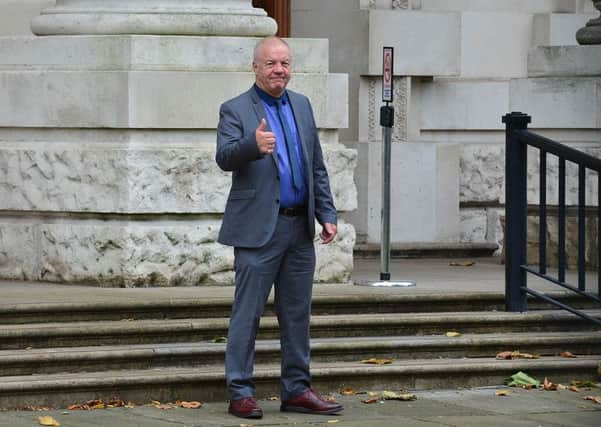Taxpayer-funded lawyer urges court to halt Brexit


In a case which has potentially momentous constitutional ramifications for the UK, Ronan Lavery QC told the High Court that it should interpret the Good Friday Agreement to mean that it was impossible for Northern Ireland to be taken out of the EU against the wishes of its people.
Mr Lavery was representing victims’ campaigner Raymond McCord who has received legal aid to take the judicial review. That decision was criticised by the DUP chairman of the Assembly’s Justice Committee, Paul Frew.
Advertisement
Hide AdAdvertisement
Hide AdThe lawyer argued that the 1998 Agreement had seen a “transfer of sovereignty” from Westminster to the Northern Ireland people over any change in the Province’s constitutional status, with Northern Ireland’s population now the “sole entity” which can decide to change its constitutional position.
He told Mr Justice Maguire: “If that means, that Northern Ireland can exercise a veto [on Brexit for all of the UK], I’m afraid that’s what the British and Irish Governments signed up to [in 1998].”
He argued that the Agreement was “premised” on EU membership for both states.
He said that Northern Ireland, with just 18 MPs, would always be out-voted in the House of Commons.
Advertisement
Hide AdAdvertisement
Hide AdThe judge asked him whether that meant that from his perspective it was “a waste of time really”, if the court was to order that Parliament should vote on Brexit before Article 50 – which formally begins the process of taking the UK out of the EU – is triggered. Mr Lavery responded: “Yes, my lord.”
Although a traditional understanding of the UK’s uncodified constitution holds that Parliament is sovereign, Mr Lavery argued that such sovereignty was in fact constrained by many factors.
He said that the rule of law meant, for instance, that a draconian or irrational Parliamentary law, such as one which outlawed judicial review or singled out red headed people, would have to be struck down by the courts.
He argued that the 1998 Agreement had conferred on Northern Ireland’s citizens a power – to decide the Province’s constitutional future – which could not be arbitrarily removed from the public.
Advertisement
Hide AdAdvertisement
Hide AdAt one point, the judge asked him: “Is that not a matter for politicians, not the courts?” Mr Lavery replied: “It’s not, my lord, if it’s an abuse of power”.
A similar case – which is being heard concurrently – brought by Sinn Fein, the SDLP, Green Party and Alliance leader David Ford (acting personally), was presented by David Scoffield QC.
Unlike Mr Lavery, he did not argue that Northern Ireland should be able to block Brexit for all of the UK, but instead urged the court to state that Parliament should have to explicitly endorse the triggering of Article 50.
He said the Government was “wrong” to say that the result of the referendum was in itself effectively a decision to leave the EU.
Advertisement
Hide AdAdvertisement
Hide AdHe said that use of the Royal Prerogative had been in decline. The judge then interjected to allude to the First and deputy First Ministers’ use of the prerogative to change the law in order to appoint a new spin doctor. With a large smile, Mr Justice Maguire said: “wasn’t it used recently?”
Mr Scoffield and Mr Lavery both referred to the Northern Ireland Act – which enacted the 1998 Agreement – as Northern Ireland’s “constitution”.
Mr Scoffield described EU law as “a pillar of the Northern Ireland constitution” and quoted the Belfast Agreement, which refers to the signatories working towards “reconciliation and rapprochement” and which says that “the functioning of the Assembly and the North/South Council are so closely inter-related that the success of each depends on that of the other”.
He said: “We ask whether that is consistent with Northern Ireland leaving while the Republic of Ireland remains within the EU?”
Advertisement
Hide AdAdvertisement
Hide AdThe judge asked: “Why doesn’t it say that neither party can leave the EU?”
Mr Scoffield said: “That’s the only way that it could be clearer” and argued that the “theme [of the Agreement] is always about [Belfast and Dublin] going closer, not about growing apart”.
The case is expected to conclude today with submissions from counsel for the Government and also a personal argument from Attorney General John Larkin.
A separate UK-wide legal challenge to Brexit will be heard at the High Court in London later this month. It has been paid for by a crowd-funded campaign.